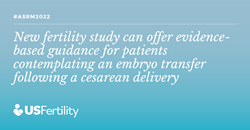
New fertility study can offer evidence-based guidance for patients contemplating an embryo transfer following a cesarean delivery.
“We wanted to have more robust data about what those risks look like so we could counsel patients with evidence-based guidelines for their family-planning goals.”
ROCKVILLE, Md. (PRWEB)
October 25, 2022
New research conducted by the US Fertility research team can provide evidence-based guidance for patients moving forward with an embryo transfer following a cesarean delivery.
Presented this week at the 78th ASRM Scientific Congress & Expo in Anaheim, California, US Fertility’s founding practices, IVF FLORIDA, Fertility Centers of Illinois, Reproductive Science Center of the San Francisco Bay Area, and Shady Grove Fertility, joined forces to conduct this study assessing the risks of shorter intervals between cesarean delivery (CD) and frozen embryo transfer (FET).
“We often see patients weighing the risks of doing an embryo transfer to become pregnant too soon after a c-section against the risks of getting older prior to their next pregnancy,” shares Janet Bruno-Gaston, M.D., MSCI, SGF Houston physician. “We wanted to have more robust data about what those risks look like so we could counsel patients with evidence-based guidelines for their family-planning goals.”
The study looked at 6,545 FETs grouped by three-month duration of time between c-section and subsequent embryo transfer. There were no statistically significant differences in implantation rate, ongoing pregnancy rate, or live birth rate. Birthweight and gestational age at time of delivery were slightly lower with shorter duration between CD and FET. However, it is unclear whether such small differences in these parameters were clinically significant in terms of the health of the newborn.
Comparing those who underwent FET less than 6 months versus more than 24 months following CD, there was less than a 200 gram difference in birthweight and less than one week difference in gestational age at delivery. While the findings were reassuring overall, it must be noted that the study was not large enough to assess rare outcomes thought to be associated with a short interval from CD to next pregnancy, such as uterine rupture. This analysis can guide patients and physicians who are balancing short interval risks with the disadvantages of delaying fertility treatment due to increasing maternal age. The study was conducted by Laura Zalles, M.D.; Samad Jahandideh, Ph.D.; Jiarui Wang, M.S.; Michael Vance Homer, M.D.; Meike L. Uhler, M.D.; Luis R Hoyos, M.D.; Kate Devine, M.D.; and Janet Bruno-Gaston, M.D.
US Fertility’s newly formed Research Division will conduct and publish high-quality research studies to advance the field of reproductive medicine to provide better, more effective care to patients in the future. Dr. Devine serves as the Executive Medical Director and Chief Research Officer at US Fertility, the largest network of physician-owned and physician-led fertility practices in the United States.
Visit the US Fertility Research Division landing page to learn more about the program and discover the latest research in the field of reproductive medicine. Contact usfresearchdivision@usfertility.com to become involved or connect with the research team.
About US Fertility
US Fertility is the nation’s largest partnership of physician-owned and physician-led top-tier fertility practices, offering comprehensive fertility-market-focused non-clinical, administrative, and technical platforms that help domestic and international practices improve patient outcomes and increase patient access. To learn more about partnership- or affiliate-status benefits, call 301-545-1308 or visit USFertility.com.
Share article on social media or email:

